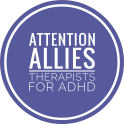Specialist supervision for ADHD and other Neurodiversities
It is probably true to state that your therapeutic training was conceived of and delivered in a neurotypical manner. This means that an assumption model was used about the people you would work with in the therapy space and who they would be, without holding in mind that many of them would diverge from that assumed model. This issue, we would suggest, has been ‘copied into’ the supervision framework and therefore, until it is addressed, it makes it difficult for supervision ‘to ensure standards, enhance quality, advance learning …’ (BACP Ethical Framework) for therapists working with ADHD (and other NDs).
Statistics suggest that up to 20 per cent of the UK population (13 million people) might be neurodivergent and, according to NICE, there is a 3 to 4 per cent incidence in the general population of ADHD. It is estimated that there are just under 700,000 children and 1.9 million adults with ADHD. These figures are likely to be underestimates – especially post-pandemic – as many ADHDers have been diagnosed by psychiatrists in private settings and don’t currently appear in official figures.
Without being aware of, or able to make, certain types of adaptations to the therapeutic models you were trained in, your consulting room might not feel like the safe and facilitating space that you imagine it to be.
By choosing to consult with one of Attention Allies’ clinical supervisors for a one-off session or on a regular basis, it will become possible for you to adapt your therapeutic space to become more accommodating and safe for ADHDers and clients with other ND issues.
Supervision for therapists working with people with ADHD might consider adaptations to the way you use pace of work, levels of directness, disclosure and variance of the use of space, and style of interventions.
If you wish to discover more about supervision with one of the allies, then you’ll find Duncan, Ana, Claire and Cat all have supervision practices and can be contacted from the links on the Therapist Directory page. We’re sure you’ll find that they have some great ideas for enhancing and expanding the therapy space for ADHDers.
Couples therapy and coaching
When one or both partners in a couple have an ADHD neurotype it can be very difficult to find the right therapist. What is generally needed is someone who can combine the listening, thinking and analysis skills of traditional therapy with a confident and facilitating personal presentation of psycho-education skills. Elements that tend to be needed for a couple to move on in their relationship include:
- self-directed goal setting
- interactive learning in the session
- real-world examples from the couple’s lives and relationships
- practical tips and strategies
- space for questions and answers
- session-by-session evaluation and feedback
- development of strategic tools
- creation of personal containment and/or motivation tools
- empathy building
- self-esteem building
- challenging the projected norms and expectation from personal social history.
To account for the extra energy and concentration needed for an ADHDer, couples therapy or coaching tends to run for just 60 minutes. It is also typical to work fortnightly, which allows time to work on issues between sessions. You might like to read the blog article Empowering ADHD/NT couples with self-determination theory (SDT) for some more information on working in therapy as a mixed neurotypical couple.
Finally, it is typical to find positive areas of your relationship to focus on as well in order to balance the work.
